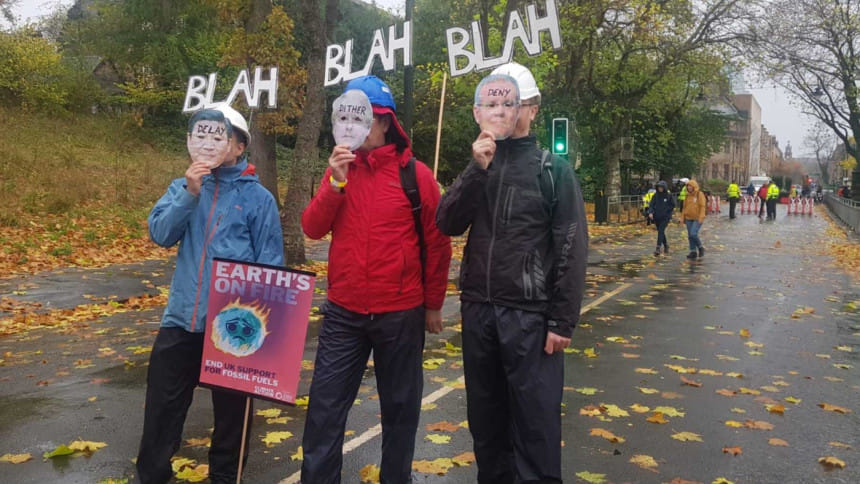To save our planet, we need to stop living unsustainably

If you're out after midnight on the streets of Dhaka, you might encounter children sniffing from plastic bags a substance they call "Dandy," a kind of glue used to mend shoes.
Most of these children weren't born in Dhaka. Their families may have lost their home to river erosion, or perhaps their farmland to salinisation. They are the climate migrants—internally displaced persons. Left without any emergency funding—which refugees get–these children spend their days sifting through garbage for anything they can sell. At night, the hallucinogenic fumes from Dandy suppress their hunger pangs and give them an escape from reality.
Withdrawal symptoms can range from sweats and chills to severe anxiety, extreme pain, palpitations, loss of cognitive abilities and muscle function—potentially leading to life-threatening complications. Advanced addictions cannot be cured without pain and damage. Specialised healthcare professionals and medication is needed to manage the process. These children will never be able to afford any of that—nor will they get any subsidies, and nor will the climate funds reach them before death overtakes them. They will all be left without help, unnoticed.
The climate crisis facing us today is the combination of endless needs, wants, indecisions, arguments, and the lack of acceptance rising out of selfishness. We are addicted to processes that will eventually kill most of mankind and irrevocably damage our planet. And we have very little time to either phase this self-destructive behaviour out, or else trigger a self-perpetuating cycle of climate change resulting in death, destitution, starvation, forced migration and unimaginable disasters for most of life on Earth.
Just like a Dandy addiction, withdrawal will be painful—even life-threatening. But there is no alternative.
The year 2020 ended with the postponement of the 26th United Nations Climate Change Conference (COP26) due to Covid-19. One more year passed in which nations were not held accountable and gave no results to help abate the climate crisis.
When COP26 eventually happened this year, David Attenborough called it an opportunity to "turn this tragedy into a triumph."
"We are the greatest problem solvers to have ever existed on Earth," he pointed out. "We know how to stop the number rising and put it in reverse."
Opportunity is there. But if the track record of the past 25 COPs was anything to go by, COP26 was never likely to "rewrite our story."
Walking down the streets of Glasgow to reach the conference centre, there seemed to be two COPs going on simultaneously—one inside and one outside. Outside, there were demonstrations and pleas for understanding, solidarity, equity, climate justice and action to keep the planet liveable. There were cries for those with power to exercise a sense of responsibility preceding self-interest and self-protection. Inside were two weeks of "intense negotiations." But negotiations on what? On whether today's development is more important than the future of this planet? On whether we need to phase out, or if phasing down will do for now? Because if we phase out, then what will happen to the 3.6 million Indians who are directly or indirectly employed in coal mining or power sectors? India currently gets at least 70 percent of its energy from non-renewables. Where will this energy come from? India's energy requirement is projected to grow more than any other nation in the world.
Then there are manufacturing processes like steel and cement still dependent on the use of coal—alternate technologies are yet to be developed. India's steel and cement production is set to triple by 2050.
This kind of growth is seen by economists as necessary for progress. If large, developing countries stop using coal, they will need enormous funds to ensure that their economies can adapt, create jobs in alternate sectors, and develop alternate technologies. Divestment from fossil fuels needs to be accompanied by investment in green technologies.
At the same time, climate-impacted economies need funds to adapt to climatic changes that are already at play, and which will continue even if we stop emitting greenhouse gases (GHGs) right away. Developing countries estimated that their need for climate financing would total about USD 1.3 trillion per year until 2030. This was left out of the Glasgow Climate Pact. Developed countries committed only to coughing up USD 100 billion more quickly, noting "with deep regret" that they had failed to give it by 2020, as previously promised.
Developed countries have refused to take responsibility for loss and damage that they have caused through their emissions thus far, which impact mostly small island nations and developing countries like Bangladesh. Rich countries don't want to take liability for this—capitulation now could be a basis to hold them liable for years to come.
There are a few small victories in the pact. Despite US opposition, references to the rapidly depleting carbon budget stayed in. There is acknowledgement of how woefully inadequate the contribution of developed countries to climate funding is, and calls for urgent scale-up. Developed countries agreed to double their pay-outs. The conversation on loss and damage was given space, but there are no commitments on this subject. They agreed to the need for finance, technology transfer and capacity-building to support adaptation. They agreed to protect nature and biodiversity, and they managed to get non-CO2 emissions such as methane into the conversation.
However, the bottom line is that countries have not planned for significant emission cuts in the next 10 years, despite net zero pledges and acceptance of the science. The Climate Action Tracker shows that if all the COP26 commitments are met, we're still headed for a global temperature rise of 2.4 degrees Celsius, which will be catastrophic (instead of 2.8 degrees Celsius without the pact, which would have been apocalyptic).
Of course, having this conference itself is a success. In fact, given COP's history of ineffective decisions and broken promises, every concession we win is a plus point. But when the stakes are high as saving humankind, anything short of that is a failure.
We asked Dr Atiq Rahman, who was instrumental in forming Bangladesh's Nationally Determined Contributions (NDC), whether developed countries are taking responsibility for their share of the damage caused by global warming. "No, absolutely not," he said. "Are rich people in Bangladesh taking responsibility for poor people here?"
Developed countries and corporations will not easily change their ways and pour all their money into solving future problems—especially when the status quo benefits them greatly. Lobbyists will make vast amounts of money trying to ensure that lucrative corporations don't lose business. In the same vein, political leaders will try not to lose popular support in their constituencies.
And so, the negotiations turn to the nitty-gritty details about who wins, who loses, who gets to keep their profits, and who gets to develop and how much. Today's development programmes, political agenda, the weighing of power and money against the cost of survival of life on this planet—this was not the intended agenda; but it feels like these considerations have shaped the outcome.
Real change requires real sacrifices. The same goes for you and I. Are we prepared to stop using plastics tomorrow, limit internet use, stop overconsumption? Are we prepared to forego our comforts today for a brighter tomorrow? We are addicted to unsustainable behaviour. To stop will hurt.
But if we change, we can still have our beautiful world. A world which will provide generously for our needs, see more equity not only among human beings, but also in sharing our planet with all those beings who inhabit it.
What would be the alternative? A world where children all over the world are displaced by intensifying climate disasters, and end up sifting through landfills for things to kill their hunger. The alternative to sustainability is a future where our children sniff glue in the dead of the night for comfort. Surely, that is not the future we want.
Runa Khan is the founder and executive director of Friendship, a social purpose organisation.

 For all latest news, follow The Daily Star's Google News channel.
For all latest news, follow The Daily Star's Google News channel. 



Comments